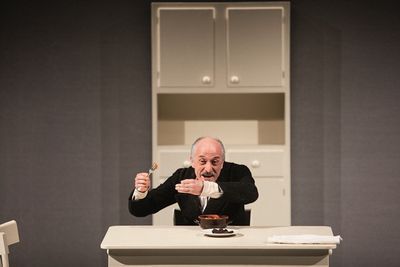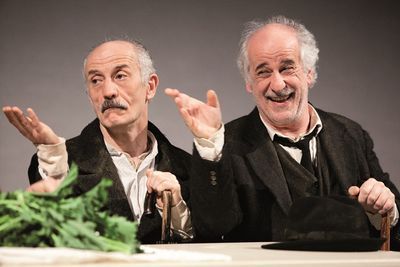Toni Servillo’s ‘Inner Voices’ at the Barbican
By Thea Lenarduzzi
Eduardo de Filippo’s play Le voci di dentro (Inner Voices) was written over the course of a few days in 1948. A run at the Piccolo Teatro di Milano was followed by two television adaptations by De Filippo (the first in 1962; the second in 1978), which helped to make it one of his most well-known plays (he wrote over fifty). In recent years, however, it has received little critical attention – until, that is, Toni Servillo – flush with awards from La grande bellezza (The Great Beauty), his most recent collaboration with Paolo Sorrentino – turned his considerable talents as actor and director to reviving it and touring it around Europe. Last night – and for two more before moving on to Madrid and then back to Italy – Inner Voices ran, with English subtitles, at the Barbican.

Peppe Servillo as Carlo Saporito
This isn’t the first De Filippo play to be taken on by Servillo and his theatre group Teatri Uniti de Napoli: their prize-winning production of Sabato, domenica e lunedì (1959) toured Europe for four triumphant seasons from 2002. It too was subsequently adapted for television, by Sorrentino. De Filippo grouped Sabato, domenica e lunedì and Le voci di dentro together in his collection of comedies written between 1945 and 1973, La Cantata dei giorni dispari – "giorni dispari" (days of inequality) as distinct from "giorni pari", which De Filippo confined to a pre-war collection. For it was, of course, the Second World War and its aftermath that dictated the switch from “pari” to “dispari”.
Servillo’s sets are paired-down, modern or, rather, timeless: off-white floor boards, off-white walls, off-white chairs with faded raffia seats, and an off-white table centre stage. Many of the actors from Servillo’s earlier production reappear in Inner Voices, with the addition of Peppe Servillo, Toni’s brother in both real life and the play, where they are Carlo and Alberto Saporito. (A nod here to the family dynamic favoured by De Filippo, who cast his sister Titina in the play’s first run and his son Luca in the 1978 film.)
The play begins with the young Maria slouched over the table asleep. She is woken by Rosa and told to look sharp, have a coffee. Both plays in fact start with two women on opposite sides of middle age busying themselves organizing the family’s food in the kitchen. But while Sabato, domenica e lunedì’s Rosa distractedly prepares her famous a ragù for the evening meal, Aunt Rosa (Betti Pedrazzi), in Inner Voices, is concerned with making breakfast – including, for her nephew Luigi, the topsy-turvy dinner-breakfast mix-up of macaroni (burnt because this Rosa, too, is distracted).
One by one, the play’s characters are brought into the blur of the morning’s activity, with sleep still in their eyes. Maria recounts a dream – which begins with a church-going maggot emerging from the broccoli and culminates in her heart jumping out of her chest and running away from her – to Rosa and the caretaker Michele (Marcello Romolo) who pops in for a coffee. (People are forever popping in in De Filippo’s plays). Michele laments that he is no longer able to dream the vivid dreams of youth (“belli come operette di teatro”), while Don Pasquale Cimmaruta, the (seemingly cuckolded) man of the house, played by Gigio Morra, complains of insomnia.
Carlo and Alberto, ageing heirs to their deceased father’s furniture rental business – the religious festivals they used to rely on are either fewer, or sourcing cheaper chairs elsewhere – call in to see the Cimmaruta family. (Neither of them eat much, they tell Rosa – you just don’t when it’s only the two of you – and yet Carlo proceeds to eat the macaroni, as well as Don Pasquale’s plumbs, thus confirming the latter’s emasculation.) Alberto becomes convinced that the family have murdered his friend Aniello Amitrano (his name playing on the centre-piece of “agnello” – lamb – at every respectable pranzo pasquale . . . ) . The police are called to take the family in for questioning: “La famiglia rispettabile”, a favourite trope in De Filippo’s plays, is set up and blown apart. (Cimmaruta; cima rotta; broken top/spire/head . . . .)
And yet there is no body, no evidence. In fact, the more Alberto thinks about it, the more convinced he is that it was all a dream – brought on by the 10g of olives and the cold pig’s trotter he shared with Carlo the night before. But by now the dream has become a vehicle for suspicion and anger on a course of its own: it has, in a sense, become fact, with each family member accusing the other and begging Alberto to produce “il documento” required by the police to put the culprit away. On a veiled mezzanine in the background, the brothers’ uncle Nicola (Šparavierzi) – who, disillusioned with humanity, has taken a vow of silence, communicating rarely in a kind of Morse Code punctuated by fireworks – dies at the height of the farce. His last and only words are: “Per favore, un poco di pace!”
The minimal action of the play is carried by unpredictable dialogue of this sort (most of it in the Neapolitan dialect which De Filippo championed). Pauses, ellipses and inversions multiply. Uncle Nicola symbolizes the fate of man to be forever misunderstood by his peers. But if, in De Filippo’s version, the comedy tended more towards the absurd, Servillo restores the menace of the original text, bringing last night’s production closer to Pinter than to Pirandello. And while De Filippo’s characters suffered the peculiar neurosis and injustices of the post-war condition (including the anxiety of never knowing if there would be coffee, or a government, in the morning), Servillo’s show that the crises – economic, religious, moral, in both public and private spheres – are just as, if not more, endemic today.
Peter Stothard's Blog
- Peter Stothard's profile
- 30 followers




